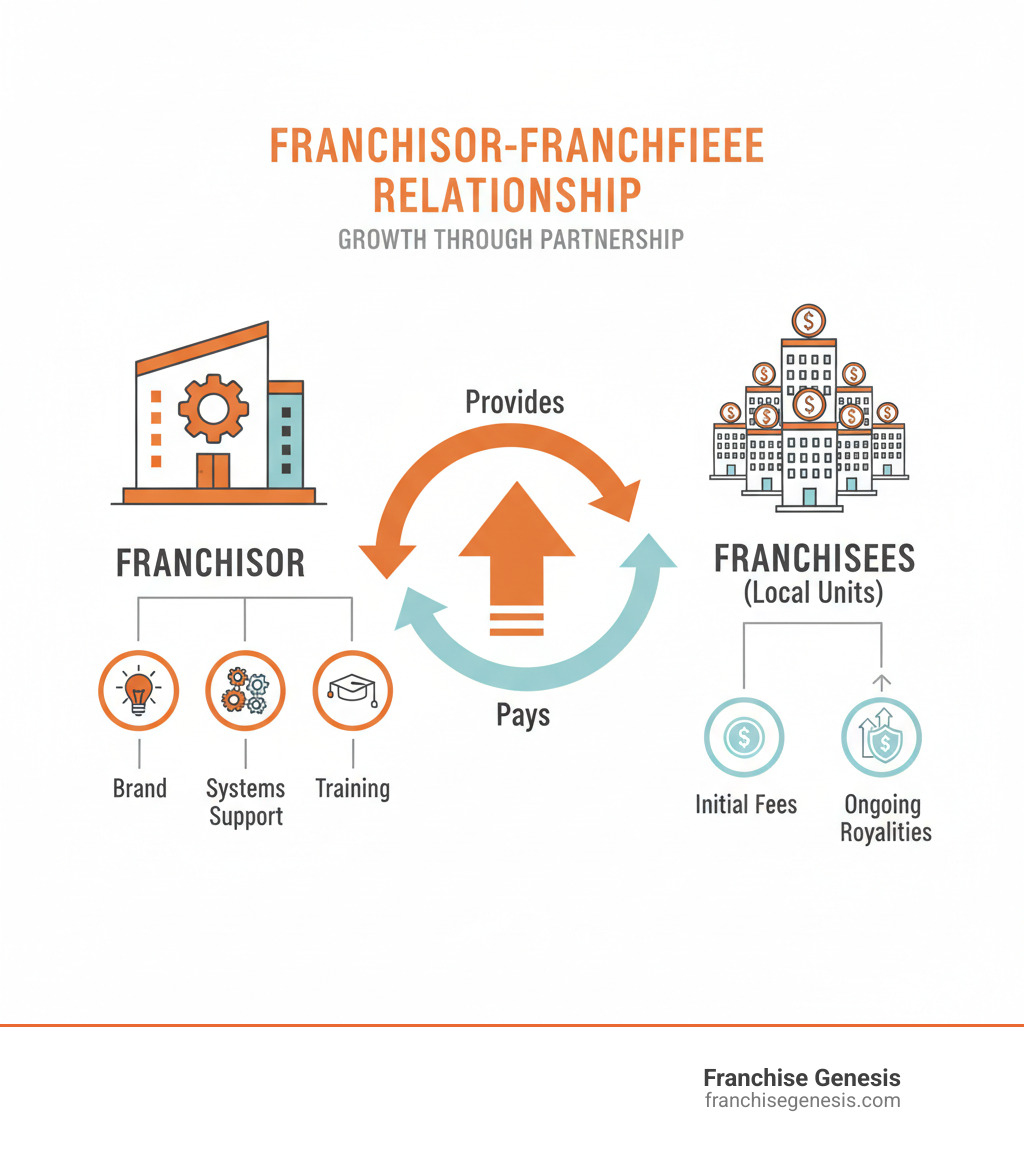Why Franchising a Business Is America’s Most Powerful Growth Strategy
Franchising a business is one of the most proven paths to rapid expansion. It allows successful business owners to license their business model, systems, and brand to independent operators. These franchisees pay fees and royalties for the right to operate under an established name, using their own capital to fuel growth.
Key Elements of Franchising a Business:
- Franchisor: The original business owner who licenses their brand and systems.
- Franchisee: The independent operator who pays to run a location using the proven model.
- Initial Fees: Typically $5,000 to $75,000 for franchise rights and training.
- Ongoing Royalties: Usually 4.6% to 12.5% of gross sales for continued support.
- Total Investment: Ranges from $10,000 to over $100,000 including all startup costs.
Franchising is a major economic driver. In the United States, there were 790,492 franchise establishments in 2022, contributing over $500 billion to the economy. Business owners choose franchising to expand rapidly with franchisee capital, replace managers with motivated owners, build brand recognition, and generate new revenue streams through fees and royalties.
As Vice President of Operations at Franchise Genesis, I’ve guided countless businesses through this journey, including scaling one brand to over 100 locations in its first year. With the right preparation, any scalable business can become a successful franchise.

Glossary for Franchising a business:
Understanding the Franchise Model: A Powerful Growth Engine
Imagine taking your successful local business and replicating it across the country. That’s the power of franchising a business. It’s a strategic partnership that allows you to license your brand and operational blueprint to entrepreneurs who are eager to run a proven concept.
As the franchisor, you provide the brand name, systems, training, and ongoing support. The franchisee is an independent business owner who invests their own money to open and operate a location, paying you for the rights and benefiting from your guidance. This relationship is built on licensing your intellectual property—the trademarks and proprietary processes that make your business unique.
This model is a sustainable growth engine, building a network of motivated owners invested in your brand’s success in their local markets. Projections for 2023 showed continued growth in the U.S. to 805,436 franchise establishments, highlighting the model’s strength.
Want to dive deeper into the fundamentals? Check out our comprehensive guide on What is Franchising?.
The Key Advantages of Franchising Your Business
Why consider franchising a business over opening more corporate locations? The advantages are compelling for ambitious owners who want to scale efficiently.
- Rapid Expansion: Franchisees use their own capital to open new units, allowing you to grow from 5 to 50 locations in the time it might take you to open a few on your own.
- Reduced Capital Investment: You can focus resources on strengthening the franchise system instead of funding individual stores. Franchisees cover the costs of rent, equipment, and staffing for their locations.
- Motivated Owner-Operators: Franchisees have their own money and reputation on the line. This personal investment often leads to superior customer service and operational excellence compared to hired managers.
- Increased Brand Recognition: Each new franchise acts as a billboard for your brand, building awareness and trust in new markets and strengthening your overall market position.
- New Revenue Streams: Beyond your original store’s profits, you’ll earn initial franchise fees (typically $5,000 to $75,000) and ongoing royalties (usually 4.6% to 12.5% of gross sales).
This model lets you leverage the capital and entrepreneurial drive of others to achieve growth that would be nearly impossible alone. For more insights, explore our analysis of Why You Should Franchise.
Franchising vs. Corporate Expansion
When it’s time to grow, you face a key choice: open more company-owned stores or start franchising a business. While both lead to expansion, the financial and operational paths are very different. Corporate expansion requires you to fund 100% of the growth, while franchising leverages franchisee capital.
| Feature | Franchising a Business | Corporate Expansion |
|---|---|---|
| Capital Outlay | Primarily funded by franchisees; lower franchisor investment | Significant capital required for each new location |
| Speed of Growth | Multiple franchisees can open simultaneously | Limited by your capital and management capacity |
| Management | Owner-operators manage daily operations | Hired managers with less personal investment |
| Risk | Shared financial risk; franchisees invest in each unit | You bear 100% of financial and operational risk |
| Profitability | Revenue from fees, royalties, and system sales | Keep 100% of unit profits but limited by unit count |
The differences in speed, management, and risk are significant. Franchisees, as owners, are deeply invested in their location’s success. While you share the profits through royalties, franchising allows for a much larger, more rapidly growing network, creating multiple revenue streams and widespread brand presence.
Is Your Business Franchisable? Key Indicators for Success

Not every successful business is ready for franchising a business. It requires more than just a great idea or local profits. Your business needs the right DNA for replication.
To be franchisable, your concept must have broad market appeal and offer something unique or clearly better than competitors. Most importantly, it must be teachable and repeatable by someone who isn’t you. If your success relies heavily on your personal talent or unique local conditions, it may not be ready. However, with proper preparation, many businesses can become excellent franchise opportunities.
A Proven and Profitable Business Model
Franchising is about selling a proven, replicable success model. Potential franchisees will want to see that your business can make them money. This requires:
- Strong Financial Performance: Your business should demonstrate consistent profitability over several years, proving the model is stable through different market conditions.
- Unique Brand Identity: Customers must actively choose your brand over alternatives. This is driven by a clear competitive advantage, whether it’s a superior service process or a unique product.
- Market Demand: There must be clear evidence that demand for your offering extends beyond your current location.
- Scalability: Your success cannot depend entirely on your personal presence. The business model must work when operated by a motivated franchisee.
Businesses that thrive as franchises have solid financial foundations and clear competitive advantages. For a deeper look, check out our guide on How to Franchise My Small Business.
A Replicable and Teachable System
Can someone else learn to run your business just as well as you do? A successful franchise is a system that produces consistent results, regardless of who is operating it.
Standardized operations are the backbone of a franchise. Every process, from customer interactions to daily routines, must be documented to ensure a consistent brand experience at every location. This reliability builds customer trust and drives repeat business across the network.
Your systems must also have strong training potential. You’ll need to transform your expertise into structured programs that can turn newcomers into competent operators. The essential systems to document in your Operations Manual include:
- Marketing and sales processes
- Daily opening and closing procedures
- Customer service protocols
- Supply chain management
Creating these systems is a significant investment, but it provides franchisees with a proven roadmap to success. Learn more about creating these crucial documents in our guide on the Franchise Operations Manual.
The Core Components of Franchising a Business

Once you’ve determined your business is franchisable, the next step is building the foundational structure. Franchising a business requires a solid legal framework and a well-designed financial model. These pillars protect your brand, set clear expectations for franchisees, and support your entire network for years to come. Getting them right is essential for attracting quality partners and achieving sustainable growth.
Legal Essentials for Franchising a Business: The FDD
The legal side of franchising is designed to create transparency and trust. The cornerstone is the Franchise Disclosure Document (FDD), a comprehensive legal document that gives prospective franchisees all the information they need to make an informed decision.
- The FTC Franchise Rule: This federal regulation requires you to provide the FDD to a prospect at least 14 days before they sign an agreement or pay any money. This gives them time to review the document, which covers 23 specific items about your business, fees, and obligations.
- State Registration Requirements: In addition to the federal rule, many states have their own franchise laws that may require you to register your FDD with them before offering franchises there. Navigating these state-specific rules is critical for compliance.
- The Franchise Agreement: Included within the FDD, this is the binding contract between you and the franchisee. It details territorial rights, fee structures, operational standards, and termination conditions.
Navigating this legal maze requires a specialized franchise attorney. We work with experienced professionals who understand these nuances. For a deeper understanding, review the FTC’s Franchise Rule Compliance Guide. Our guide on From Business to Franchise Conversion also explains this transition.
Key Financials for Franchising a Business: Fees and Royalties
Your financial structure creates the revenue streams that fuel your growth. Structuring fees correctly is key to attracting franchisees while ensuring your own profitability.
- Initial Franchise Fee: This is a one-time payment, typically from $5,000 to $75,000, that grants a franchisee the right to use your brand. It covers your costs for their initial training, site selection assistance, and grand opening support.
- Ongoing Royalties: This is a recurring payment that funds your ongoing support and provides you with a steady income. It is usually a percentage of gross sales, with industry averages ranging from 4.6% to 12.5%.
- Advertising Fund: Many franchisors require franchisees to contribute a small percentage of sales (often 1-3%) to a national or regional ad fund. This pooled money builds brand awareness that benefits the entire system.
Determining your fee structure requires careful market research. You need to find the sweet spot that is competitive enough to attract quality candidates but sufficient to fund your support obligations and generate profit. Our Franchise Startup Costs guide offers more insight into structuring your fees competitively.
Your Step-by-Step Guide to Launching a Franchise

Turning your business into a franchise is a manageable process when broken down into clear phases. The journey of franchising a business typically takes 90 days to one year, depending on your business’s complexity. At Franchise Genesis, we’ve refined this process to ensure a solid foundation is built before you begin marketing to potential franchisees.
Phase 1: Strategy and Legal Preparation
This foundational phase is critical for protecting your brand and setting up your franchise system for long-term success.
- Create Your Franchise Entity: The first step is to establish a separate legal entity for your franchising operations. This protects your original business and creates a clean structure for managing the franchise network.
- Protect Your Brand: Your name, logo, and taglines are valuable assets. We guide you through registering your trademarks with the United States Patent and Trademark Office to ensure legal protection and exclusivity.
- Define Your Franchise Structure: We help you decide on the right offering, whether it’s single-unit franchises, multi-unit development agreements, or master franchising arrangements, to align with your growth goals.
- Draft Your Franchise Disclosure Document (FDD): We partner with experienced franchise attorneys to create your FDD. This comprehensive legal document (often 300-700 pages) must comply with all federal and state regulations, protecting both you and your future franchisees.
For more insights into this process, see our guide on how to Franchise Your Business.
Phase 2: Operations and Marketing Setup
With the legal framework in place, the focus shifts to packaging your business model into a replicable and attractive opportunity.
- Prepare Audited Financials: Audited financial statements are required for your FDD in most states. They demonstrate your company’s financial health and build credibility with prospective franchisees.
- Finalize Your Operations Manual: This guide is the recipe for your business’s success. We help you document everything from daily procedures and customer service standards to marketing tactics, ensuring consistency across all locations.
- Develop Your Training Programs: New franchisees need hands-on guidance. We help you design comprehensive initial and ongoing training programs that empower your partners to succeed.
- Create Compelling Marketing Materials: To attract high-quality franchisees, you need a professional franchise website, brochures, and presentations that clearly communicate your brand’s unique value proposition.
Our expertise in Franchise Sales & Marketing ensures you are well-equipped to attract the right partners to grow your brand.
Frequently Asked Questions about Franchising a Business
When considering franchising a business, many owners have similar questions. Having guided hundreds of entrepreneurs, I’ve compiled answers to the most common concerns.
How much does it cost to franchise my business?
While costs vary, a comprehensive program for franchising a business can often be structured for well under $50,000. This investment is significantly less than the cost of opening a single new corporate location. Your primary costs will include:
- Legal Fees: For drafting your FDD and franchise agreement with a specialized attorney.
- Consulting Fees: For strategic guidance and development support.
- Auditing Costs: To prepare the required financial statements for your FDD.
- Operations Manual Development: To document your business systems.
- Trademark Registration: To legally protect your brand.
Our Franchising Consulting Cost Guide breaks these expenses down in greater detail.
How long does the process take?
Most of our clients are ready to offer franchises within 90 days to one year. The timeline for franchising a business depends on factors like your business complexity and the speed of legal and financial preparations. Key milestones include strategic planning, legal documentation (FDD), operations manual development, and state registrations. We handle the heavy lifting, requiring only about an hour of your time weekly or bi-weekly, allowing you to continue running your business.
What are the biggest risks for a new franchisor?
Understanding the risks of franchising a business is the first step to avoiding them. The most common pitfalls for new franchisors include:
- Growing Too Fast: Expanding faster than your support systems can handle leads to frustrated franchisees and damages your brand.
- Choosing the Wrong Franchisees: A franchisee without sufficient capital, skills, or cultural fit can harm your brand’s reputation. A rigorous screening process is essential.
- Inadequate Support Systems: Franchisees depend on you for training, marketing, and ongoing guidance. Failing to provide quality support can cause their businesses—and your brand—to suffer.
- Legal Compliance Issues: Franchise law is complex. Working with experienced franchise attorneys is critical to avoid costly mistakes.
- Inconsistent Brand Standards: If franchisees don’t follow your proven system, it dilutes your brand’s value and confuses customers.
At Franchise Genesis, our process is designed to help you steer these challenges and build a sustainable, profitable franchise system.
Conclusion
Franchising a business is a powerful strategy to transform local success into a national brand. It creates a win-win relationship where you provide a proven blueprint, and motivated entrepreneurs provide the capital and local execution to grow it. With over 790,000 franchise establishments contributing more than $500 billion to the U.S. economy, the model’s effectiveness is undeniable.
Success, however, requires careful preparation. Your business must be profitable, replicable, and teachable. You need a solid legal framework, a detailed operations manual, and robust training programs to ensure a consistent customer experience across all locations.
The investment to properly franchise—typically under $50,000 and taking 90 days to one year—is often far less than the cost of opening a single new corporate location. Instead of using your own capital, you generate revenue from initial franchise fees and ongoing royalties while franchisees fund the expansion.
For business owners ready to take the next step, franchising offers an incredible opportunity. The path can be complex, but with the right guidance, it is absolutely achievable. At Franchise Genesis, we simplify the journey by handling the legal, operational, and strategic details, allowing you to focus on building your brand.
